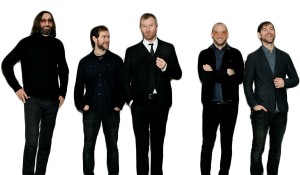The National Mistaken for Strangers
The National, one of the most popular and critically acclaimed indie-rock groups making music today, rocked the Shrine Auditorium Tuesday.
The National didn’t just put on a typical rock concert. The National’s live performance was preceded by the first L.A. screening of Mistaken for Strangers, a documentary about the group directed by Tom Berninger, the brother of The National’s frontman, Matt Berninger.
What might have seemed like an exercise in ego became one of the most important aspects of the evening and completely changed the dynamic of the night.
Mistaken for Strangers, in reality, is not a documentary about The National. It’s a documentary about how two brothers struggle to reconcile the financial and critical successes of one versus the relatively unsuccessful financial and critical life of the other.
It is a documentary made by a brother who loves heavy metal and hates indie-rock, who makes amateur horror movies about cannibals with identity crises, and who manages to become as much a part of the night as his brother and the band.
Mistaken for Strangers is unlike most other music documentaries. Shot on a hand-held camcorder, Tom Berninger attempts to make a documentary reminiscent of home movies. The documentary begins with Tom’s attempts at interviewing Matt Berninger, asking inane questions until Matt Berninger impatiently interrupts him and asks whether he had any sort of plan for filming the movie.
It becomes clear that Tom Berninger’s film began without any sort of initial planning. The finished product, however, provides a humorous and uncomfortably familiar experience for anyone who has had to deal with family tension.
Though the classic narrative dynamic of “successful sibling versus less successful sibling” might seem forced at times, what makes this documentary so fascinating is its beginning without any understanding of what kind of direction it would head in.
For each moment that might seem overly cinematic, the audience is later reminded that what they are seeing is reality in how the relationship between the Berninger brothers plays out.
The narrative progression might seem overplayed, but when the viewer considers that this was a documentary made without any initial sense of direction, and that it came close to being abandoned multiple times, it becomes even more fascinating to see the kind of storyline that emerged out of the hundreds of hours of tape.
The film has its humorous and somber moments, oftentimes moving between the two within a matter of seconds. This is where Mistaken for Strangers really draws its authenticity, and not just from the DIY aesthetic of the shots.
Not only are there shots of Matt Berninger’s temper, but the film captures some uncomfortably tense moments between the brothers. The honesty in portraying the tensions that bloom out of having a sibling considered more successful than the other gives Mistaken for Strangers an edge over other music documentaries, endearing both brothers to the audience.
More cynical fans might say that the documentary was just one big public relations stunt, set less on endearing fans and more on displaying their ego.
The night, however, was emblematic of what film and music can do together to blur the line between audience and performer.
After the film, The National took the stage for a live set. As the band roared through song after song, each one feeling like the band’s biggest hit based off the audience’s reactions, one began to wonder whether Tom Berninger would make another appearance.
Before getting fired from his filmmaking role halfway through the film, Tom Berninger had been hired as a roadie for The National’s tour in addition to his documentary purposes. Some might say it’s impossible to make one of the most well-known indie bands in the world and a room of 6,000 people feel like a family. But that’s exactly what happened at the end of the night.
As Matt Berninger crowd-surfed his way through the audience during the second-to-last song of their set, something different happened. The grins, cheers and pats on the shoulder weren’t just directed toward one person, but two.
Matt Berninger was the subject of adoration, but right behind him was his brother, keeping the microphone cable above the heads of the spectators. And he was cheered on and encouraged by the crowd, with people thumping his back and attempting to hug him.
As the song finished, both brothers embraced in the crowd, and the sheer joy felt in the room could only have been made possible by the personal connection that Mistaken For Strangers established for the audience.
Tom Berninger’s documentary was premiered at exactly the right time and location. For fans of The National, seeing the documentary right before a live set with both brothers working together was a poignant reminder of why the audience loved the group.
Though it’s not always possible to be presented publicly, the common experiences of frustration, disappointment and humiliation shared between the musicians and the members of the audience are what keep people listening.
It is these experiences, in fact, that The National bases its music on and why people continue to buy its records.
At least for a night, The National succeeded in breaking through the wall between a musical group and its fans that usually puts musicians on a personally distant pedestal. As members of the band filed on the stage for the live performance, the atmosphere of the room had moved beyond that of a group and its adoring fans to one that felt like a family.
And as fans filed out of the Shrine Auditorium at the end of the night with satisfied grins on their faces, 6,000 Angelenos could all say they felt like one big family.


